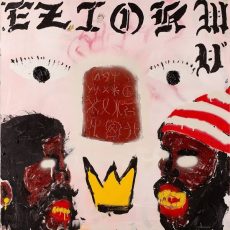
Best New Music: ODUMODUBLVCK, Bloody Civilian & Wale make menace sound thrilling with “Blood on the Dancefloor”
A perfect, carefree unison of gangster and catchy, rap and pop.

A perfect, carefree unison of gangster and catchy, rap and pop.
There’s a prevailing idea amongst many Nigerian rap fans that when a rap artist diversifies their approach—i.e. incorporates more melodic and groovy elements—it dilutes the credibility of their output. Some of it comes from a sense of preservation, considering the frequently loud conversations about the commercial value of rap, especially when you place rappers next to pop stars. It’s a nuanced discussion with moving parts and a lot of two-dimensional opinions, but from a purely musical standpoint, it’s glaring when rap artists organically scale up for dynamism, rather than trying to hack the system solely for commercial gains.
Amidst more than a handful examples, think Show Dem Camp and their ‘Palmwine Music’ series, Ladipoe’s eagerness to share lifelines over pop-leaning production, as well as the curious case of ODUMODUBLVCK and his patented Okporoko Music style. Last Friday, Odumodu released his anticipated major label debut mixtape, ‘EZIOKWU’, and it’s the latest representation of a Nigerian rap artist erasing the boundaries of what should be considered Nigerian rap.
As is the lore, Odumodu began garnering attention as a grimy, say-it-as-it-is lyricist, stomping over alternately explosive and sliding 808 bass. In recent years, especially coinciding with 2021’s ‘Time & Chance’, he started exploring melodic cadence of his baritone, leaning into his Igbo heritage for effortless authenticity. It’s not that ODUMODUBLVCK mellowed out his sound, it’s that he’s become more accessible to a wider audience without alienating the niche community that initially identified with and championed his music. At the centre of ‘EZIOKWU’ is “Blood on the Dancefloor,” arguably the most polished he’s sounded till date, but it’s also an adept exhibition of how he continues to marry grit and gloss.
To be simplistic and putting it in strictly hip-hop terms, Odumodu is a gangster rapper. The terms and imagery in his music often references illicit trades, fatal street deals and run-ins with the law, all of which have contributed into a portrait of invincibility. The seen-it-all emphasis of his raps make him an easy (yet somewhat complex) cult hero, but the true magnetic quality that has turned him into a star is in how his music doesn’t just sound accessible, it explicitly dares you to not rap and sing along.
“Blood on the Dancefloor” is another addition to those lung-filling, voice-raising ODUMODUBLVCK anthems. For example, I dare you to not mouth or scream “supposing I fall in with my kala like this and that” after you’ve heard it even once, and that’s not even the hook. You may or may not have a Kala, but the euphoria, especially in that stagger-step flow, is intoxicating. Odumodu’s invincibility becomes tangible. Every uttered line is explicit, it’s the music and delivery that subverts the danger—or better yet, makes it thrilling.
View this post on Instagram
Produced by JimohSoundz and Deepaholiq, the buoyant scape comprises a groovy percussion pattern with log drum rimshot accents—faintly reminiscent of Mohbad’s “Peace”—but it’s the looped, knotty guitar riff that gives “Blood on the Dancefloor” its Okporoko flavour. That’s the dancefloor part taken care of; for the blood, Odumodu doesn’t waste any time telling us that his bullets don’t go to waste, regardless of whoever’s turf it is. “Opportunity no be wetin I go look then pass,” he asserts on his verse, a line that can mean several things to several people, both within the context of the song or as a relatable lyric.
In another masterstroke, Bloody Civilian features on this song, an apt choice not just because of how well the moniker lines up, but also for her wondrous skill at expressing irreverence. Of course, the author of “How to Kill a Man” isn’t averse to sharing disdain for her opps. Rounding out the song’s trio, American- Nigerian rapper Wale offers a simple advice: “Bring a gun to the fight.” No one is going to classify Wale as gangster, but the paranoia of celebrity and rolling with niggas who pack heat informs his verse. ODUMODUBLVCK may not have had mainstream fame long enough to deal with that paranoia, but he will bring a gun to the fight.
Again, “Blood on the Dancefloor” makes menace sound thrilling. The best element, arguably, is the harmony between Odumodu and Bloody, an alliance that pairs gruff and flutter in perfect, carefree unity. It’s a definitive part of a song where gangster and catchy, rap and pop are in perfect, carefree unison.

